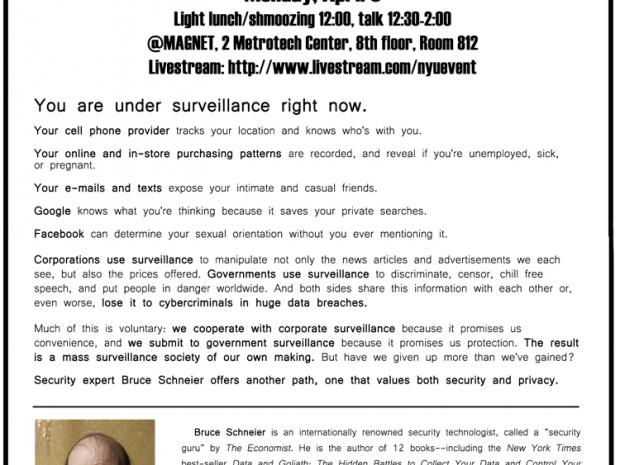Data and Goliath: The Hidden Battles to Collect Your Data and Control Your World

This event will be livestreamed. To see a live feed of the event, visit http://www.livestream.com/nyuevent
You are under surveillance right now. Your cell phone provider tracks your location and knows who's with you. Your online and in-store purchasing patterns are recorded, and reveal if you're unemployed, sick, or pregnant. Your e-mails and texts expose your intimate and casual friends. Google knows what you're thinking because it saves your private searches. Facebook can determine your sexual orientation without you ever mentioning it. Corporations use surveillance to manipulate not only the news articles and advertisements we each see, but also the prices were offered. Governments use surveillance to discriminate, censor, chill free speech, and put people in danger worldwide. And both sides share this information with each other or, even worse, lose it to cybercriminals in huge data breaches. Much of this is voluntary: we cooperate with corporate surveillance because it promises us convenience, and we submit to government surveillance because it promises us protection. The result is a mass surveillance society of our own making. But have we given up more than we've gained? Security expert Bruce Schneier offers another path, one that values both security and privacy.
About Bruce Schneier
Bruce Schneier is an internationally renowned security technologist, called a "security guru" by The Economist. He is the author of 12 books -- including the New York Times best-seller "Data and Goliath: The Hidden Battles to Collect Your Data and Control Your World" -- as well as hundreds of articles, essays, and academic papers. His influential newsletter "Crypto-Gram" and blog "Schneier on Security" are read by over 250,000 people. Schneier is a fellow at the Berkman Center for Internet and Society at Harvard Law School, a program fellow at the New America Foundation's Open Technology Institute, a board member of the Electronic Frontier Foundation, and an Advisory Board member of the Electronic Privacy Information Center. He is also the Chief Technology Officer of Resilient Systems, Inc.

